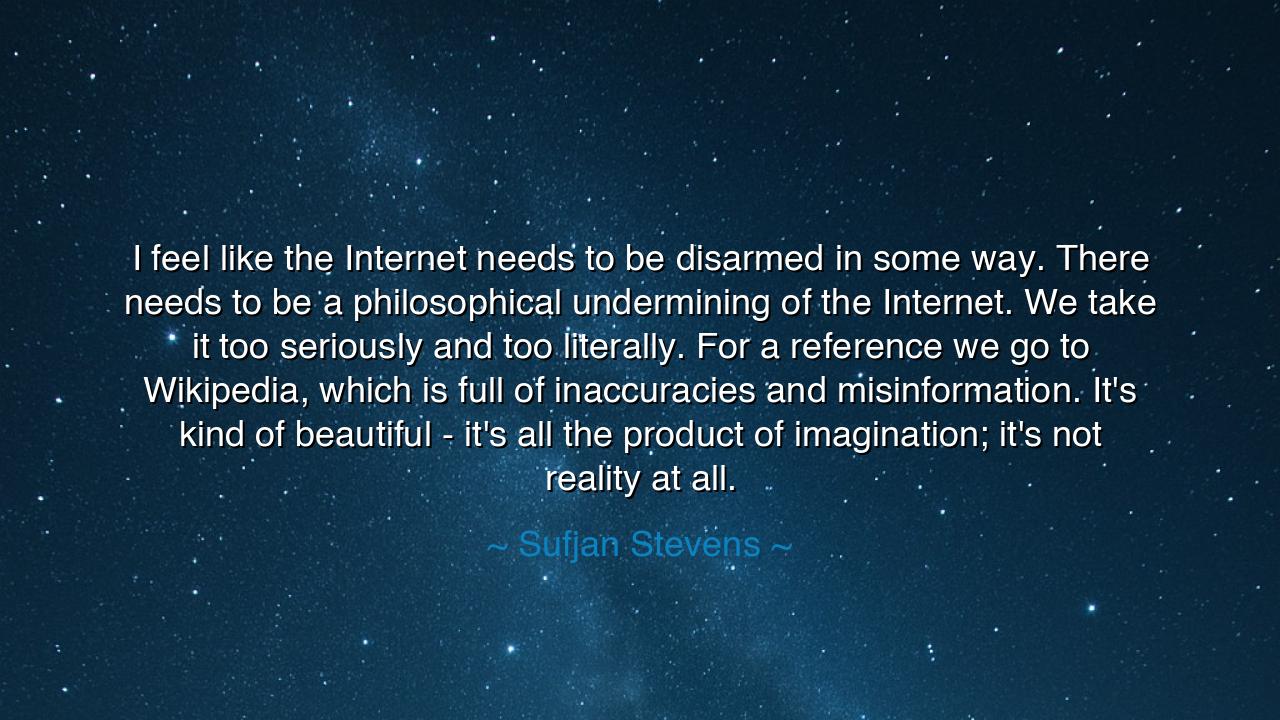
I feel like the Internet needs to be disarmed in some way. There
I feel like the Internet needs to be disarmed in some way. There needs to be a philosophical undermining of the Internet. We take it too seriously and too literally. For a reference we go to Wikipedia, which is full of inaccuracies and misinformation. It's kind of beautiful - it's all the product of imagination; it's not reality at all.






“I feel like the Internet needs to be disarmed in some way. There needs to be a philosophical undermining of the Internet. We take it too seriously and too literally. For a reference we go to Wikipedia, which is full of inaccuracies and misinformation. It's kind of beautiful — it's all the product of imagination; it's not reality at all.” – Sufjan Stevens
In these thoughtful and haunting words, Sufjan Stevens, the poet-musician and seeker of modern meaning, gives voice to a profound truth about the age in which we live. He calls upon us to see the Internet not as the final source of truth, but as a shimmering reflection — a vast mirage of human thought and imagination, where truth and illusion are woven inseparably together. His tone is not that of anger, but of wonder. He sees both danger and beauty in the digital realm, both chaos and creativity. The Internet, he reminds us, is a mirror of humanity itself: dazzling in its reach, yet perilous in its illusions.
When Stevens says that the Internet must be “disarmed,” he speaks as a philosopher, not as a rebel. To disarm something is not to destroy it, but to strip it of its false authority, to remove the power we have mistakenly given it. In our time, people have come to treat the Internet as a temple of truth, a repository of absolute knowledge. We kneel before the glowing screen as though it were an oracle, accepting its proclamations as sacred. But Stevens warns us: this is not reality. The Internet is a construction — a product of imagination, shaped by millions of hands and voices, each imperfect, each colored by desire, ignorance, and bias. It is, in essence, a living myth.
His observation of , “full of inaccuracies and misinformation,” is not meant to condemn it, but to reveal something paradoxically beautiful about it. It is a collective dream, a modern tapestry of human imagination where truth is forever being revised, rewritten, rediscovered. It is an imperfect but fascinating artifact of the human urge to record, to explain, to understand. In its errors, we glimpse our own fallibility; in its vastness, our longing for connection. Stevens calls it “beautiful” because it embodies the same creative imperfection that defines art, story, and even history itself. The problem, he suggests, is not that the Internet is wrong — it is that we have forgotten how to read it as myth, not scripture.
In truth, this insight echoes the wisdom of the ancients. Long before the Internet, men mistook symbols for truth. The Greek philosopher Plato warned of the cave, where people watched shadows on the wall and called them reality. In his allegory, the shadows were projections of real objects, yet the prisoners believed the images to be the whole truth. So it is with the digital world today: we see the shadows of knowledge on our glowing screens and think we have grasped the thing itself. Stevens, like a modern Plato, calls us to turn from the wall — to see that the light behind the illusion is the imagination, not the truth.
History gives us other examples of humanity’s dangerous faith in illusion. When the printing press was born, many believed it would herald a golden age of knowledge — yet it also unleashed centuries of propaganda, superstition, and manipulation. The power of the written word, like that of the Internet, had to be tempered with philosophical awareness, with the wisdom to discern truth from illusion. Stevens’s plea for a “philosophical undermining” of the Internet is precisely this: we must awaken our critical spirit, our humility, our ability to see that knowledge without wisdom is noise, and that technology without reflection can make us forget the depths of our own being.
And yet, Stevens’s vision is not one of despair. He calls the Internet “beautiful” precisely because it springs from the same source that gave rise to art, story, and song — the human imagination. It is a realm of invention, of collective dreaming, where millions of minds co-create the myth of our age. The Internet is both chaos and creation, and like all human endeavors, it reveals what we are. To “disarm” it, then, is not to reject it, but to see it clearly: to use it as a tool for connection and creation, not as an idol of truth.
So let this be the lesson passed down from Sufjan Stevens’s words: approach the Internet as a philosopher, not a worshipper. Question it, play with it, create within it, but never mistake it for the real. Feed your imagination, but also ground it in reality — in nature, in silence, in genuine human presence. For only by stepping outside the network can we see it for what it is: a dream woven of data, a collective imagination striving for meaning.
Therefore, my children of the digital age, take this wisdom to heart: use technology, but do not be used by it. Let the Internet remain what it truly is — a beautiful illusion, a reflection of the mind’s endless capacity to invent. Cherish its creativity, but seek your truth elsewhere: in the stillness of thought, in the breath of conversation, in the living world that no screen can fully capture. For only there, beyond the glow of imagination’s web, will you find what is real.






AAdministratorAdministrator
Welcome, honored guests. Please leave a comment, we will respond soon